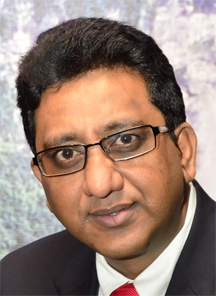Attorney General Anil Nandlall yesterday argued that the Supreme Court’s role as the guardian of the constitution gives it automatic jurisdiction to hear his motion challenging the numerical composition of several key parliamentary committees.
The hearing into the constitutional motion filed by Nandlall continued before acting Chief Justice Ian Chang and during a more than two-hour long presentation, Nandlall attempted to challenge arguments that the court had no authority to interfere in the affairs of Parliament.
David Granger, the leader of the list of candidates of A Partnership for National Unity (APNU) as well as Leader of the Opposition, and Raphael Trotman, the leader of the list of candidates of Alliance for Change (AFC) as well as Speaker of the National Assembly, are named as the respondents in the motion, in which Nandlall maintains that representation in the committees must be based on the proportionality of seats that parties won at last November’s election.

“…The court has automatic jurisdiction of the matter as guardian of the constitution,” Nandlall stressed in response to submissions made by a battery of lawyers representing the respondents. He reminded the court that the Notice of Motion alleges that there is a provision of the constitution which is being violated and argued that the allegation in itself confers jurisdiction upon the court.
He rejected the lawyers’ argument that the court is absolutely barred from inquiring into parliamentary matters. Nandlall drew the court’s attention to several parts of the constitution that stipulate that “Parliament cannot make rules that collides with or is in contravention of this document.”
Nandlall further argued that Parliament was created by the constitution and therefore “cannot act outside of it.” In several countries, legislation dealing with these rights and privileges has been passed, he said, “but unfortunately not in the case of Guyana.” He later submitted that outside of these rights and privileges, “there is no bar against questioning the conduct of Parliament.”
Nandlall also challenged arguments raised by Senior Counsel Rex McKay, the lead counsel for Granger, who had contended that the motion was bad in law, lacking grounds since no attempt was made to seek a remedy under Article 153 of the constitution, which empowers the High Court to rule in cases to ensure or secure fundamental rights. McKay had explained that a Constitutional Motion is preserved for the infringement of rights under Articles 138 to 151.
But Nandlall argued yesterday that the Constitution is a “contract between the State and citizens and I submit that if one person violates it, then the other party must have recourse.” He said that the fact that there is no other article that allows access to the court other than Article 153, “this should not be a basis for denying access to the court.”
Nandlall also cited several cases from Dominica, New Zealand, and Canada, among others, which have found that if there is a violation of any provision “you can approach the court for remedy.” He, however, conceded that the remedy is not specific here.
Attorney Basil Williams, who is also appearing for Granger, later accused Nandlall of mischaracterising the arguments against the court’s jurisdiction. He clarified that during his submissions, he said that under the constitution, the court can inquire but when it comes “to the internal affairs of Parliament the court can’t inquire.”
McKay along with lawyers for Trotman, Khemraj Ramjattan and Roysdale Forde, supported their colleague with various submissions.
Nandlall said in response to Williams that he had demonstrated instances where the internal affairs of Parliament have been the subject of the courts examination and review. He also accused the attorneys of attempting to introduce new points, but added that the issues they were raising would be addressed as he was only halfway through his submissions.
According to the motion filed earlier this month, Nandlall is seeking a declaration that all standing committees and special select committees of the National Assembly of the 10th Parliament “are to be constituted in proportion” to the number of seats which each political party was allocated in the National Assembly based on the elections results.
“The composition of the Committee of Selection is violative of the principle of proportionality as contemplated by the Constitution since with this configuration the PPP/C with 32 seats has the same representation in the committee with APNU which only secured 26 seats. Therefore the PPP/C has only 44.44 percent of the representation with 32 seats and APNU has the same 44.44 percent representation, but with only 26 seats, leading to a disproportionality of almost five seats,” he argues.
He is also seeking a declaration that the composition of the Committee of Selection done by elections – PPP, four; APNU, four and AFC, one – is a violation of the “principle of proportionality as contemplated by Articles 60 and 160 of the constitution and the provisions of the Elections Law (Amendment) Act No. 15 of 2000 and accordingly, unconstitutional, unlawful, null, void and of no effect.”
He is additionally asking the court for orders setting aside, revoking, cancelling or annulling the composition of the committee on the grounds that it was in breach of the Constitution and a breach of the provisions of the Elections Laws (Amendment) and further directing the respondents and their servants/agents to constitute all Standing Committees and Sectoral Committees and every other Committees of the 10th Parliament, whose composition are not expressly set out in the Constitution, with due regard to and in compliance with the principle of proportionality.
The case continues on Friday.




